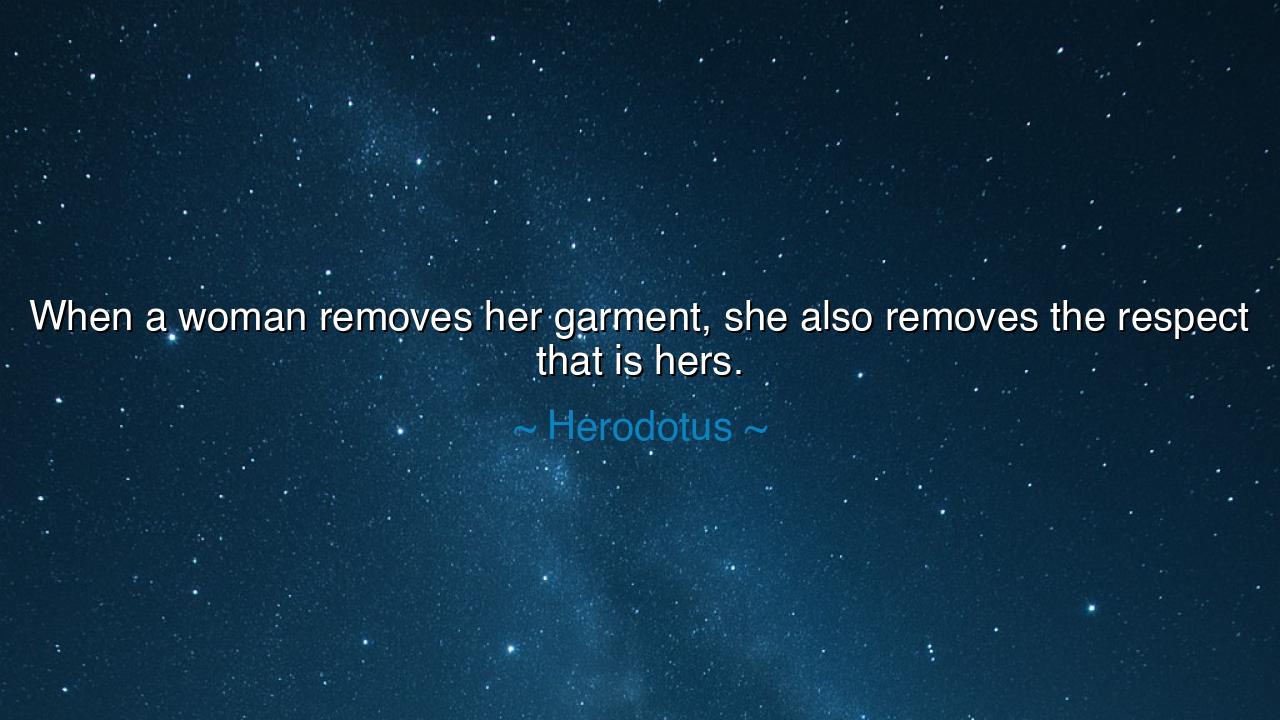
When a woman removes her garment, she also removes the respect






In the provocative words of Herodotus, “When a woman removes her garment, she also removes the respect that is hers,” we are confronted with a reflection on honor, modesty, and the societal expectations placed on women. Herodotus, often regarded as the father of history, uses this statement to explore how external actions—such as the removal of clothing—can be seen as indicative of personal worth and dignity. In his time, society held honor and respect as virtues tied to one’s appearance and the way one presented themselves. For women, who were expected to maintain a certain level of modesty and propriety, these external markers became deeply tied to their moral value.
The origin of this quote is rooted in the historical context of ancient Greek and Persian cultures, where the status of women was tightly bound to how they were perceived by society. In the era of Herodotus, the act of removing one's garments was more than just a physical gesture—it symbolized a loss of modesty and a shift in social standing. Herodotus’s words reflect the gender norms of his time, where women were expected to adhere to a strict code of behavior that kept them within the boundaries of decorum. To step outside of these boundaries—whether through immodesty or other actions—was often seen as a violation of the social contract, leading to a loss of respect in the eyes of the community.
In the ancient world, the concept of modesty and virtue was often symbolized by the garment itself. In Homer’s epics, for example, characters like Penelope in the Odyssey embody the ideal of modesty, always maintaining the appearance of a faithful and virtuous wife, despite the prolonged absence of her husband. Penelope’s virtue is tied to her unwavering loyalty, symbolized by her unblemished appearance, and the garment she wears reflects her role as the steadfast protector of the family. This ideal of modesty and integrity is in stark contrast to those characters who engage in deceptive or immodest behaviors, often facing punishment or dishonor as a result. In Herodotus’s world, a woman’s garment was not simply a physical piece of clothing but a symbol of her worth, a mark of her place in society.
Consider, too, the ancient Persians, a culture known for its deep reverence for social status and the distinction between genders. In the Persian court, a woman’s position and honor were heavily influenced by her appearance and the way she comported herself in the presence of others. If a woman’s behavior violated these norms—whether through immodesty or failure to maintain the expected appearance—it was often seen as a rejection of the values of the society, and this loss of respect was reflected not just in her social standing, but in her personal dignity. The concept that modesty and respect are inextricably linked can be found across many ancient cultures, from the Greeks to the Romans, where virtuous women were often those who maintained their decorum in public life.
However, while Herodotus’s statement speaks to the deeply ingrained norms of his time, we must also recognize that modesty and respect are culturally defined and change over time. In modern societies, there is much debate about the relationship between external appearance and personal worth. For many, the removal of a garment does not necessarily signal a loss of respect but rather can be seen as an expression of empowerment, freedom, or choice. In this light, Herodotus’s words must be understood in the context of a specific cultural and historical framework, one that does not easily map onto today’s understanding of individual autonomy and personal dignity. In fact, modern sensibilities challenge the very idea that a woman’s value is tied to her appearance or the act of removing her garments.
The lesson of Herodotus’s quote, however, lies not in its literal interpretation, but in its broader meditation on respect and self-presentation. It calls us to consider the role of external symbols in shaping how we perceive ourselves and how others perceive us. In the modern context, this can be seen as a reflection on how we express ourselves, whether through our clothing, our words, or our actions. While Herodotus’s view may seem narrow and restrictive by today’s standards, it underscores an important idea: that respect is not just something inherent to us but is shaped by the way we present ourselves to the world. How we hold ourselves, the values we project, and the dignity we maintain in our lives all have an impact on the respect we garner from others.
In our own lives, we can take this lesson and apply it thoughtfully, understanding that personal dignity is not solely defined by external actions but by the integrity with which we live. Just as Herodotus reflected on the role of garments in defining respect, we must recognize the importance of modesty, humility, and self-respect in our daily lives. We must ask ourselves: How do we present ourselves to the world? Do we honor ourselves through our actions and choices, or do we fall prey to external pressures that might lead us away from our authentic self? Whether in the ancient world or today, the call to maintain respect and honor is one that transcends time, urging us to live with purpose and integrity, not just for the admiration of others, but for the honor of the soul itself.






AAdministratorAdministrator
Welcome, honored guests. Please leave a comment, we will respond soon